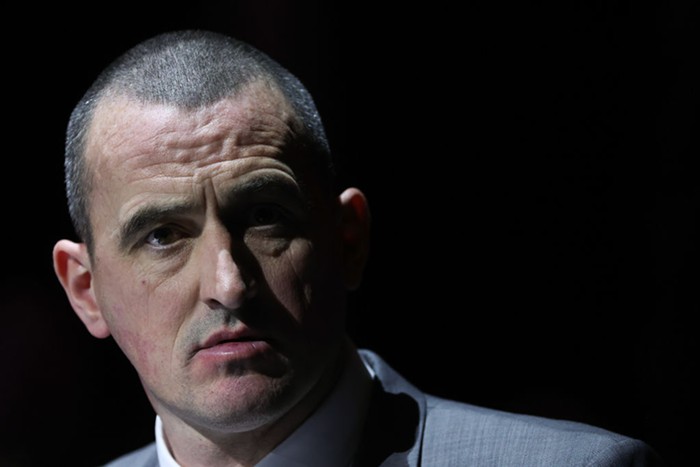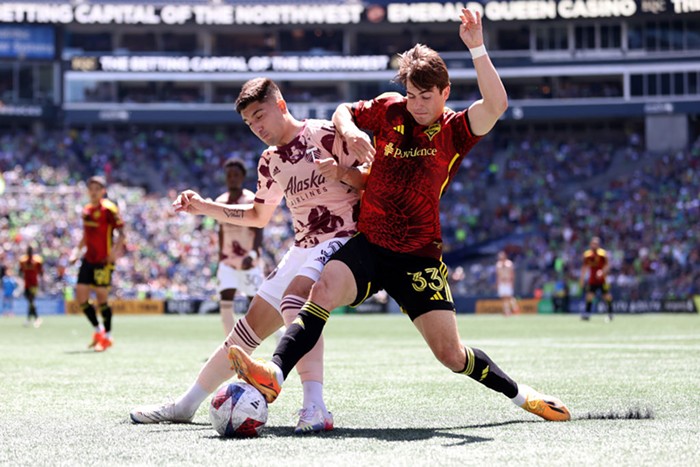
It certainly started well enough for the Portland Timbers on Saturday night in Houston: after just nine minutes, via a deflected Alvas Powell cross, they'd taken a not undeserved lead against the host Dynamo.
From there, though, the Timbers unraveled in comprehensive fashion. The Dynamo scored the game's next four goals, snapping a ten-game winless streak, and burying the Timbers in the process.
It was a familiar scene. The Timbers have never won an MLS game in Houston, and they ended this one as they've ended plenty of others down the years — moving in slow motion through the stifling heat and humidity, long have given up chasing anything but the final whistle.
That's how it goes in this league in Texas, and that's especially how it goes when you've played as much soccer as the Timbers have over the last two months. They came out with the right intensity, played a solid first 20 minutes, and then melted away.
In that process, they were pretty well demolished at their own game. As they did to such great effect on their run to the Western Conference Finals last year, the Dynamo ceded possession, sat back, and crushed the Timbers on the break.
For their struggling front players, namely Alberth Elis and Mauro Manotas, it was a near-cathartic night. Manotas, who now has six career goals against the Timbers, could have put up a four spot on his own.
But it's worth noting, again, that the game began on a very different note. In fact it was the Dynamo, without a win since early July and well out of the playoff picture, who started the game as the Timbers finished it: in a stupor of sorts.
The Timbers took their early lead when Powell, who was one of the standout players when last these teams met in Portland, curved a low cross into the penalty area that deflected off of Alejandro Fuenmayor and spun over Dynamo goalkeeper Joe Willis into the back of the net.
It wasn't long, though, before warning signs began to flash. The Timbers nearly gave the own goal back when a recycled corner redirected by Larrys Mabiala forced a goal-line clearance from Julio Cascante, and, just after the half hour mark, did lose their lead on a set piece.
After Elis was tugged down in the open field by Zarek Valentin, Tomas Martinez crossed in a central free-kick, and Lawrence Olum didn't bother to track the Honduran — who smacked his header off of the inside of the near post and in the opposite side netting.
It was a staggering mental lapse Olum, and it was only the beginning of the fun. Seven minutes later, Houston took the lead on a play that started when Willis uncorked a long throw to Martinez, who, in acres of space, turned to run at the Timbers' exposed backline.
The Argentinian playmaker sent the ball wide to Elis, who tore by Valentin and fired the ball in front where Manotas arrived to slide it in.
It was far, far too easy, and, in many ways, the story of the evening. The Timbers midfield was nowhere to be found in transition, with Olum and Cristhian Paredes both painfully far from the pace, and the team's backline wasn't nearly quick enough to compensate.
Diego Chara might have been a savior defensively, as he has so often been in the past, but he was again pushed too far wide to make his maximum impact.
Instead, Chara did his best to make an impact on the other side of the ball — and just before halftime, with the Timbers trailing by a goal, he did in a big way: gambling and getting into the box, as he did several weeks ago against Toronto, to tap home a Diego Valeri cross and tie the game.
The problem was that Valeri had strayed into an offside positioning before receiving Sebastian Blanco's tucked pass, which allowed a video review to take the goal off the board and restore Houston's lead heading into the interval.
It was, to put it lightly, not the break the Timbers needed. Flagging as they were in the latter part of the first half, the second half, during which they'd have to chase a goal, was always destined to become a rout.
Manotas blasted a point blank chance over the bar to begin the period, but, some 20 minutes later, he'd make amends.
Again, he had Elis to thank. The Honduran winger picked up the ball in transition and drove straight at Jorge Villafaña, who, having replaced Valentin, stuck with him cut-for-cut — but couldn't prevent him from firing off a cross that Steve Clark flapped at and Manotas plucked out of the air with a clean volley for 3-1.
Ten minutes later, the Dynamo would get another goal off a deflection — their third of the night, and as good an indication as any of how slow the Timbers were defensively in and around their penalty area. This time it was Fuenmayor, whose night started so poorly, who slotted a redirected corner through Clark's legs.
Only after this fourth concession did Olum's night end. His replacement David Guzman's lone contribution was a orange-card worthy tackle on Martinez with three minutes to play.
It was a lost night, and while it'll be easily forgotten if the Timbers can secure positive results on Wednesday night against Columbus and in Minnesota next Saturday, the team's margin for error in this Western Conference playoff race is getting smaller and smaller.
The Timbers now sits in sixth place in the West — just two points from fourth, yes, but with no more games in hand. If they finish in fifth or sixth, and have to go on the road to play a Wild Card game, the odds of their postseason lasting more than 90 minutes won't be high.
More important is the feeling that Giovani Savarese still hasn't found this team's optimal setup. Is a wide position really the best way to utilize Chara? Is Sam Armenteros, the player whom the club ran Fanendo Adi out of town for, really not a starter at this point in the year?
The Timbers have survived this year on the strength of their defensive organization, a couple of tremendous players, and their largely unrivaled homefield advantage. To give themselves a shot in the playoffs, however, they're going to need to build something more — and they're running out of time to build it.
















